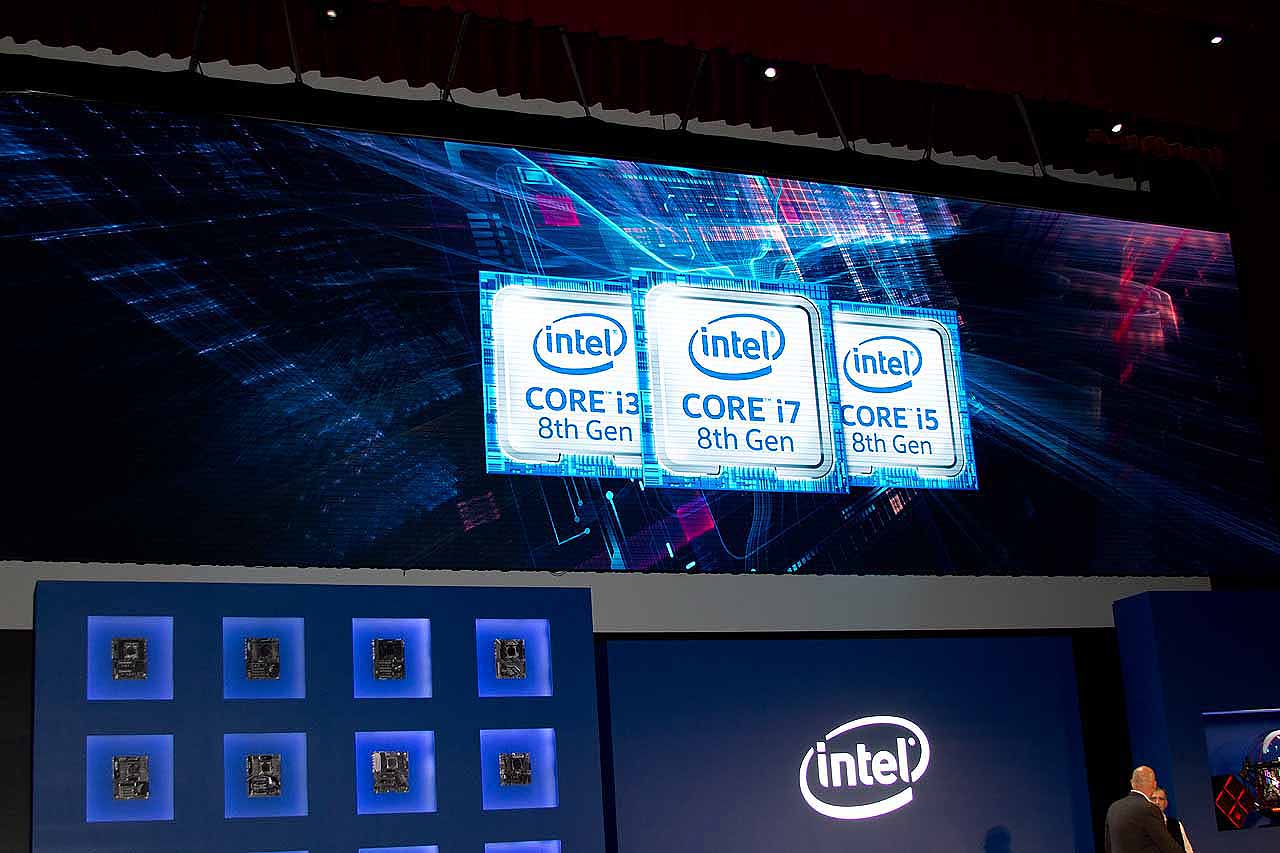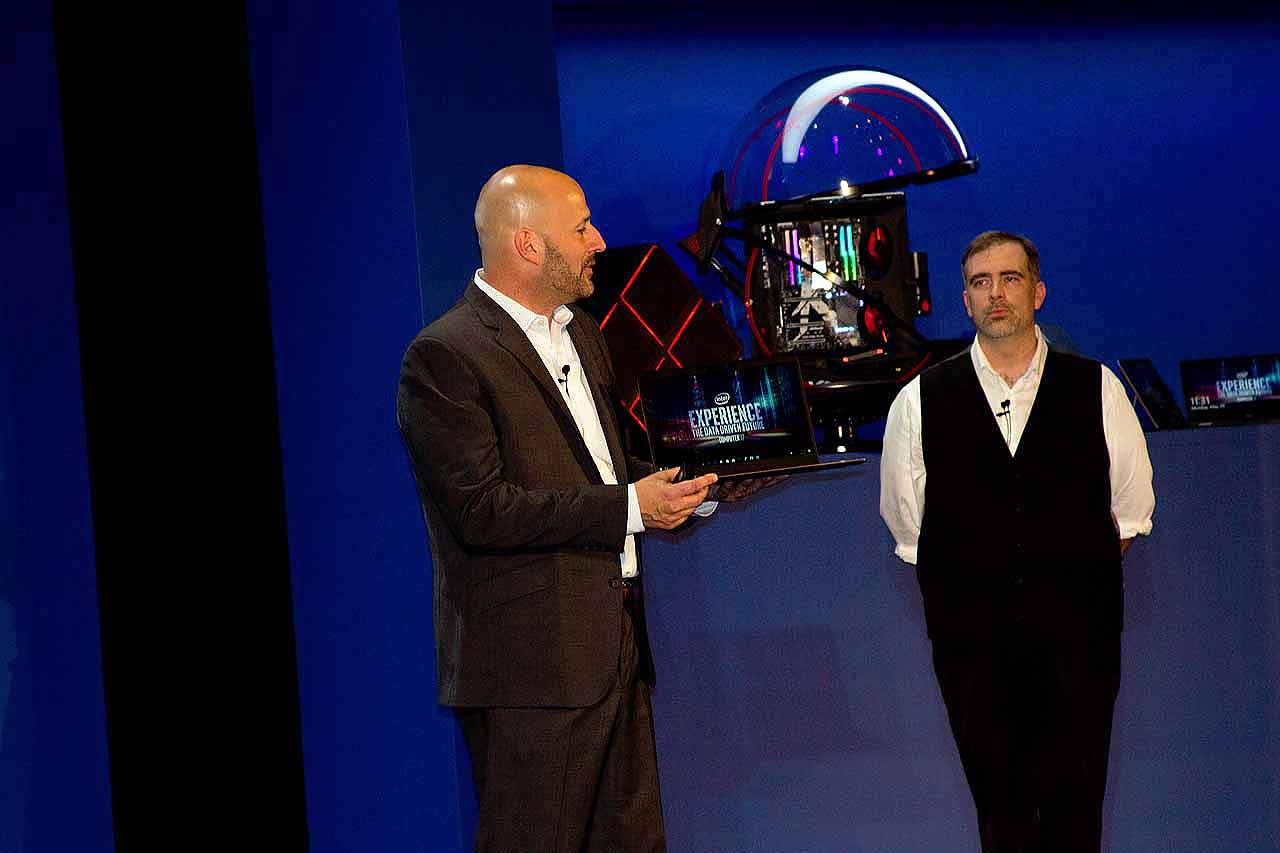Intel: 8th-Gen Processors Are 30% Faster Than 7th-Gen
Intel announced during its Computex 2017 keynote that the eighth-generation Coffee Lake processors would feature 30% more performance than the seventh-generation Kaby Lake processors. The announcement was light on detail, though, but the company did bring a laptop powered by Intel's eighth-generation processors on stage.
Intel also issued a press release that is similarly light on details, although it does give us a footnote to pore over.
8th Gen Intel Core processor on the horizon: As we move toward the next generation of computing, Intel also shared its commitment to deliver 8th generational Intel Core processor-based devices by the holiday season, boasting more than 30 percent improvement in performance versus the 7 Gen Intel Core processor.2Based on SYSmark* 2014 v1.5 (Windows Desktop Application Performance). Comparing 7th Gen i7-7500U, PL1=15W TDP, 2C4T, Turbo up to 3.5GHz, Memory: 2x4GB DDR4-2133, vs. Estimates for 8th Gen Core i7: PL1=15W TDP, 4C8T, Turbo up to 4 GHz, Memory: 2x4GB DDR4-2400, Storage: Intel SSD, Windows* 10 RS2. Power policy assumptions: AC mode. Note: Kaby Lake U42 performance estimates are Pre-Silicon and are subject to change. Pre-Si projections have +/- 7% margin of error.
It's important to note that the estimates are pre-silicon, meaning Intel didn't actually test the final processors that it wheeled onto the stage in the laptop. These projections have a +/- 7% margin of error, so we could be looking at a 23% or 37% increase in performance.
| Header Cell - Column 0 | 8th Gen Core i7 | 7th Gen Core i7-7500U |
|---|---|---|
| Cores/Threads | 4/8 | 2/4 |
| TDP | 15W | 15W |
| Turbo (GHz) | 4.0 | 3.5 |
| Base (GHz) | - | 2.7 |
| Memory | 2x4GB DDR4-2400 | 2x4GB DDR4-2133 |
| Storage | Intel SSD | Intel SSD |
Intel tested performance with the SYSmark 2014 v1.5 utility, which is an Intel-optimized benchmark. That shouldn't matter much, as the company is only comparing against its own products.
The eighth-generation processors do feature the 14nm++ process, which is the third stepping in the new Process-Architecture-Optimize cadence that replaced Intel's famed tick-tock cadence, whereas the seventh-generation processor employs the 14nm+ process. The eighth-generation Core i7 has twice the cores and threads of its previous-generation counterpart, so it's likely the performance gain is due to the more robust thread count as opposed to any radical architectural IPC improvements.
It is an impressive achievement to cram double the number of cores into the same 15W TDP envelope, and the 500MHz increase in TurboBoost clocks is a nice improvement, as well. We aren't privy to the new base clocks, though.
Get Tom's Hardware's best news and in-depth reviews, straight to your inbox.
Intel's eighth-generation chips are slated for release later in the year, so we should expect more information to trickle out from the Intel marketing machine as the year progresses.

Paul Alcorn is the Editor-in-Chief for Tom's Hardware US. He also writes news and reviews on CPUs, storage, and enterprise hardware.
-
iPanda wait, maybe i'm just tired... but shouldn't it have scaled a bit better than that with the faster clocks, memory, and more cores/threads?Reply -
legokangpalla Is it Tick-tock-tock or Tick-tock-tock-tock?Reply
Broadwell was Tick, so Skylake-Kaby-Coffee is.... -
bigpinkdragon286 They are comparing a 2C/4T @ 3.5 GHz to a 4C/8T that can turbo up to 4 GHz. Of course performance is going to scale with computing resources. What is the actual IPC improvement, or is there any?Reply -
mac_angel double the cores, double the threads, faster RAM, and they are bragging about a 30% increase?Reply -
InvalidError Reply
I'd guess the same IPC per core gain as usual, which would be 5-8%.19755685 said:What is the actual IPC improvement, or is there any?
-
TheKappaccino @IPANDA Well the 7700HQ (the current base quad core and a 45W chip) scores about 1.55x higher than the 7500U they are comparing to. Taking that into account, as well as a possible decrease in base clock to help manage the increase in cores, a 30% increase in performance is reasonable. Especially if they don't want the new quad core U-series chips performing too well and cannibalizing the more expensive HQ models.Reply -
TEAMSWITCHER "double the cores, double the threads, faster RAM, and they are bragging about a 30% increase?"Reply
Do you think that an 18-Core i9 or 16-Core ThreadRipper will run at 4.5 GHz? Clock speeds will drop to counter power consumption. -
anbello262 This will only apply to low power cpus, which would actually mean a 30% efficiency improvement at most. Unlocked desktop processors with no power limit will most likely be quite similar to what we already have...Reply

